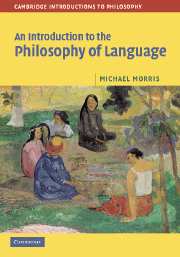Book contents
- Frontmatter
- Contents
- Acknowledgements
- Introduction
- 1 Locke and the nature of language
- 2 Frege on Sense and reference
- 3 Russell on definite descriptions
- 4 Kripke on proper names
- 5 Natural-kind terms
- 6 Quine on de re and de dicto modality
- 7 Reference and propositional attitudes
- 8 The semantics of propositional attitudes
- 9 Davidson on truth and meaning
- 10 Quine and Davidson on translation and interpretation
- 11 Quine on the indeterminacy of translation
- 12 Austin on speech acts
- 13 Grice on meaning
- 14 Kripke on the rule-following paradox
- 15 Wittgenstein on the Augustinian picture
- Glossary
- Works cited
- Index
7 - Reference and propositional attitudes
Published online by Cambridge University Press: 05 June 2012
- Frontmatter
- Contents
- Acknowledgements
- Introduction
- 1 Locke and the nature of language
- 2 Frege on Sense and reference
- 3 Russell on definite descriptions
- 4 Kripke on proper names
- 5 Natural-kind terms
- 6 Quine on de re and de dicto modality
- 7 Reference and propositional attitudes
- 8 The semantics of propositional attitudes
- 9 Davidson on truth and meaning
- 10 Quine and Davidson on translation and interpretation
- 11 Quine on the indeterminacy of translation
- 12 Austin on speech acts
- 13 Grice on meaning
- 14 Kripke on the rule-following paradox
- 15 Wittgenstein on the Augustinian picture
- Glossary
- Works cited
- Index
Summary
Key text
W. V. O. Quine, ‘Quantifiers and Propositional Attitudes’, Journal of Philosophy, 53 (1956), pp. 177–87.
Introduction
Linguistic constructions count as intensional if they raise problems for the rule of extensionality. Where extensionality reigns we can swap singular terms which refer to the same object, predicates which are true of the same things, and sentences which have the same truth-value (either both true or both false), without affecting the truth-value of the whole sentence in which such expressions occur. In chapter 6 we looked at problems which arise in connection with one kind of intensional construction – modal constructions (to do with possibility and necessity). In this chapter we'll look at some related problems with another kind of intensional construction – propositional-attitude constructions. Intensional constructions in general are of central interest in the analytic tradition, because they are a principal focus of what I've called the Basic Worry about the view, which has been adopted enthusiastically in the analytic tradition, that the meaning of words is concerned with things in the world, rather than things in the mind. The relevant aspect of Basic Worry is that this world-directed view seems to require two words which are associated with the same thing in the world to have the same meaning, but that seems counter-intuitive in some contexts. Intensional constructions are the most obvious contexts in which it seems counter-intuitive.
A propositional attitude is a state of mind whose nature can be characterized using a whole sentence embedded within a ‘that’-clause.
Information
- Type
- Chapter
- Information
- An Introduction to the Philosophy of Language , pp. 134 - 151Publisher: Cambridge University PressPrint publication year: 2006
